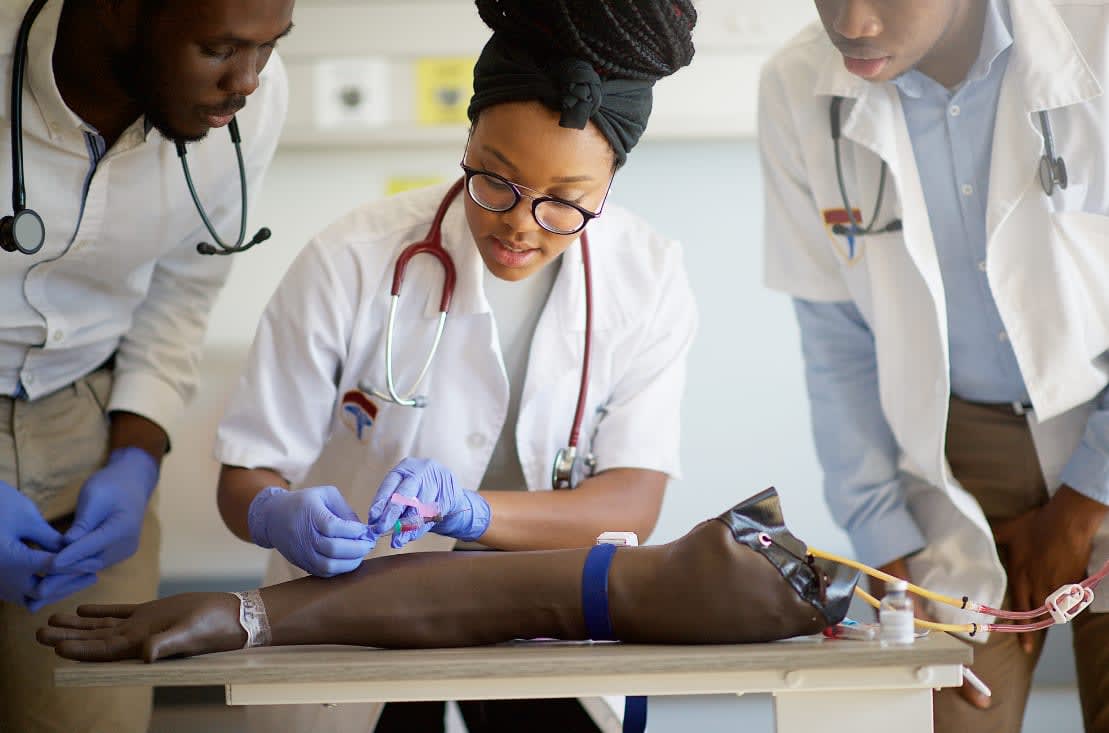Phlebotomy Training Course Costs Explained: Ways to Save
Phlebotomy Training Course Costs Explained: Ways to Save
Blog Article
The Course to Certification: Recognizing the Phlebotomy Training Training Course Journey and Its Significance
As you consider the path to certification in phlebotomy, it is essential to recognize the duty you'll play in healthcare. Your training will certainly cover vital abilities, from blood collection strategies to patient interaction. Each part of the program prepares you for the challenges ahead. What precisely does the journey require, and why is certification so essential for your future profession? Let's explore these questions further.

The Function of Phlebotomists in Health Care
Phlebotomists play an important duty in the health care system, serving as the important web link between patients and essential analysis testing. You'll perform blood attracts, making certain samples are collected properly and securely. Your competence helps in detecting medical problems, keeping an eye on health and wellness, and guiding treatment decisions.
In your day-to-day interactions, you'll require to establish trust fund with individuals, making them feel comfy throughout what could be a stressful experience. You're liable for identifying and handling examples carefully to avoid contamination or errors, which could influence test outcomes.
Yet, you'll often function alongside medical professionals and nurses, connecting essential info regarding individuals' conditions. Your function is fundamental in maintaining the process in health care setups, making certain timely and accurate outcomes. By understanding your skills, you add meaningfully to patient care, making you an indispensable part of the medical team. Welcoming this duty is key to your success as a phlebotomist.
Introduction of Phlebotomy Training Programs
When discovering phlebotomy training programs, you'll locate different types developed to fit different schedules and learning styles. Each program aids you create crucial abilities like blood collection and person communication. Comprehending these choices is crucial to selecting the ideal path for your occupation.
Kinds Of Educating Programs
A number of types of training programs are offered for those looking to become skillful in phlebotomy. Additionally, some health centers and centers supply on-the-job training programs, supplying practical experience while you discover. Whatever course you select, each program intends to equip you with the essential skills for an effective phlebotomy profession.

Key Abilities Developed
Understanding phlebotomy needs a set of key abilities that are developed via thorough training programs. In addition, communication abilities are essential; you'll need to engage with clients, clarify procedures, and placed them at simplicity. Each of these skills is crucial for your success as a licensed phlebotomist, making you a valuable property in any type of healthcare setup.
Secret Elements of a Phlebotomy Program
In a phlebotomy course, you'll concentrate on necessary topics that prepared for your future career. You'll participate in hands-on training that allows you to use what you have actually discovered in real-world settings. Both the curriculum and useful experience are essential for your success as a phlebotomist.
Curriculum Overview
While going after a phlebotomy training course, you'll come across a curriculum made to equip you with essential skills and understanding. Phlebotomy school. This curriculum commonly includes makeup and physiology, concentrating on the blood circulation system and recognizing blood elements. You'll additionally discover various kinds of blood collection techniques, including venipuncture and capillary leak strategies
Furthermore, infection control and safety and security protocols are crucial components, guaranteeing you understand just how to keep a sterilized setting. You'll study patient interaction, stressing communication and compassion, which are critical for reducing client stress and anxiety. Finally, ethical and legal factors to consider will certainly be addressed, preparing you for real-world duties. This foundational understanding will enable you to stand out as a phlebotomist and give top quality treatment in clinical settings.
Hands-On Training Experience
Obtaining hands-on experience is a vital part of your phlebotomy training program. This practical training permits you to apply what you have actually learned in a real-world setup, enhancing your abilities and self-confidence. Phlebotomy Classes Near Me.
In addition, you'll get the possibility to interact with individuals, which is important for creating your communication abilities. This mix of technological efficiency and social skills is important for your success as a certified phlebotomist. Eventually, hands-on training is where concept meets method, strengthening your knowledge and readiness for qualification.
Certification and Licensing Demands
Prior to you can start your profession in phlebotomy, it is essential to understand the accreditation and licensing needs that vary by state. A lot of states call for phlebotomists to hold a certification from an acknowledged company, such as the National Phlebotomy Association or the American Society for Scientific Pathology. These qualifications generally entail passing an exam that checks your expertise and skills in the area.
Along with certification, some states have particular licensing needs. You may require to finish a certain number of hours in medical method, send evidence of training, or undertake a history check. It is necessary to investigate your state's regulations to make certain you fulfill all required requirements.
Remaining educated concerning these needs not only helps you secure a setting however likewise improves your credibility as a professional. By satisfying these requirements, you'll be well on your way to a successful career in phlebotomy.
Hands-On Training and Practical Experience
Hands-on training and practical experience are important components of your phlebotomy education, as they allow you to apply theoretical understanding in real-world circumstances. During your training, you'll participate in monitored venipuncture, find out appropriate methods, and become knowledgeable about numerous blood collection devices. This direct involvement is essential for constructing your self-confidence and developing your skills.
You'll work very closely with knowledgeable experts who can lead you via the image source nuances of patient communication and example handling. Each practice session not just strengthens your understanding but additionally prepares you for the busy atmosphere of healthcare setups.
Additionally, several programs integrate clinical turnings, enabling you to experience varied settings, from medical facilities to outpatient clinics. This direct exposure helps you adjust to different obstacles and individual requirements, guaranteeing you're well-prepared for your future function. Accept these opportunities, as they're vital to ending up being a proficient and thoughtful phlebotomist.
Difficulties Faced Throughout Training
While gaining hands-on experience is crucial, it is necessary to identify the difficulties that can emerge during your phlebotomy training. You may come across stress and anxiety when executing procedures on genuine people, particularly if you're brand-new to the setting. The pressure to get whatever right can be frustrating. Additionally, grasping the abilities needed for blood attracts takes technique; you might deal with technique initially.
Time monitoring can also be a hurdle, as balancing theory, useful sessions, and personal commitments can feel intimidating. You may face varying learning speeds among your peers, resulting in feelings of self-doubt if have a peek at this site you think you're falling behind. Adapting to the various individualities of teachers can be tough, as each might have a special mentor style.
Acknowledging these obstacles at an early stage can prepare you for success and assist you establish resilience throughout your training journey.
Job Opportunities After Qualification

As you get experience, you might also consider concentrating on areas like pediatric or senior citizen phlebotomy, satisfying specific individual requirements. Some phlebotomists choose to advance their jobs by ending up being laboratory professionals or seeking further education and learning in healthcare areas.
In addition, your accreditation can bring about functions in training or supervising brand-new phlebotomists, permitting you to share your knowledge. With the medical care industry consistently growing, your abilities check my site will certainly constantly remain in demand, paving the means for a stable and fulfilling occupation. Welcome the opportunities waiting on you!
Regularly Asked Questions
What Is the Normal Period of a Phlebotomy Training Course?
Phlebotomy training courses commonly last around four to eight weeks. You'll take part in hands-on method, class guideline, and on-line learning. Completing this training prepares you for accreditation and a fulfilling career in healthcare.
Are Online Phlebotomy Courses Available?
Yes, on the internet phlebotomy programs are readily available. They supply flexibility and convenience, allowing you to examine at your own speed. Simply confirm the program is recognized to satisfy qualification demands and obtain beneficial abilities for your career.
How Much Does Phlebotomy Training Usually Price?
Phlebotomy training typically costs between $700 and $2,500, depending on the program and area. You should consider factors like course length, included materials, and hands-on experience when choosing the ideal training for you.
What Prevail Requirements for Phlebotomy Training?
Typical requirements for phlebotomy training typically include a high college diploma or GED, immunizations, and a history check. Some programs may also need fundamental healthcare understanding or accreditations, guaranteeing you're gotten ready for hands-on training.
Can I Work While Finishing My Phlebotomy Training?
Yes, you can function while completing your phlebotomy training. Many trainees equilibrium tasks with their researches, however make sure to manage your time properly to guarantee you fulfill both work and training commitments efficiently.
Report this page